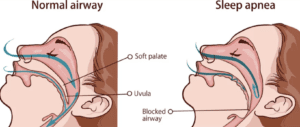Over the last couple of decades, sleep apnea has gotten more national attention. Estimates show that between 50-70 million people in the US have sleep disorders, including sleep apnea. Sleep apnea is a sleep disorder that affects a patient’s breathing as they sleep. It is a condition that many people either don’t know enough about or take it seriously enough. For those who have sleep apnea, it is vital that they seek treatment and continue to follow their doctor’s instructions.
While the increased attention has made more people aware of sleep apnea, it perhaps has not done enough to convince people of the seriousness of the disorder. Some of the symptoms can be mild. Yet, many symptoms of more advanced cases can increase the likelihood of death. Arguably, this makes sleep apnea a severe and deadly disorder. Patients with sleep apnea need to be more aware of the side effects of sleep apnea so that they continue to seek treatment.

Types of Sleep Apnea
Sleep apnea comes in many forms.
One of the most common types of sleep apnea is obstructive sleep apnea. With this type of sleep apnea, the soft tissues of your mouth and throat actually block your airway while you sleep. While it is normal for your muscles to relax as you sleep, your tongue and soft palate relax too much and obstruct your airway.
The oxygen levels in your blood reduce when you do not get enough oxygen. To fix this, your brain rouses you from sleep. This brief awakening is usually too short to remember as you fall back to sleep. Unfortunately, this may continue to happen multiple times a night—up to 30 or more times.
A less common form of sleep apnea is central sleep apnea. Your airway is not the problem with central sleep apnea—your brain is. There are basic functions that your body performs without thinking—heartbeat, blinking, breathing, etc. With central sleep apnea, the brain doesn’t send the right signals to the muscles that control your breathing. This means that you go a short period of time without breathing. Your brain will wake you once your oxygen levels dip too low.
Finally, there is complex sleep apnea. This form of sleep apnea is a combination of obstructive sleep apnea and central sleep apnea.
Effects on Your Health
Sleep apnea has a wide range of effects on your body, but the more serious ones need more attention.
The constant up and down of your oxygen levels and blood pressure put your body in a stressful state. When you are stressed, your body releases hormones—adrenaline and cortisol—to allow you to move more quickly. Your body is not meant to be in a fight or flight state for long periods of time. This drastically affects your immune system, making you more susceptible to illnesses.
Your heart undergoes a lot of stress with sleep apnea. The rapid changes in blood pressure strain your entire cardiovascular system. Additionally, sleep apnea increases your risk of dangerous heart conditions like high blood pressure, heart attacks, or strokes.
